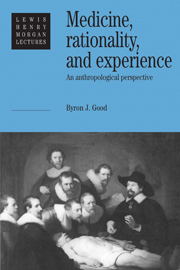Book contents
- Frontmatter
- Contents
- List of figures
- Foreword by ANTHONY T. CARTER
- Preface
- 1 Medical anthropology and the problem of belief
- 2 Illness representations in medical anthropology: a reading of the field
- 3 How medicine constructs its objects
- 4 Semiotics and the study of medical reality
- 5 The body, illness experience, and the lifeworld: a phenomenological account of chronic pain
- 6 The narrative representation of illness
- 7 Aesthetics, rationality, and medical anthropology
- Notes
- References
- Author Index
- Subject Index
1 - Medical anthropology and the problem of belief
Published online by Cambridge University Press: 05 June 2012
- Frontmatter
- Contents
- List of figures
- Foreword by ANTHONY T. CARTER
- Preface
- 1 Medical anthropology and the problem of belief
- 2 Illness representations in medical anthropology: a reading of the field
- 3 How medicine constructs its objects
- 4 Semiotics and the study of medical reality
- 5 The body, illness experience, and the lifeworld: a phenomenological account of chronic pain
- 6 The narrative representation of illness
- 7 Aesthetics, rationality, and medical anthropology
- Notes
- References
- Author Index
- Subject Index
Summary
Part of the special delight of being invited to give the Morgan Lectures was the opportunity it afforded me to read the work of Lewis Henry Morgan and be reacquainted with his life. Though largely remembered for his masterful ethnography of the Iroquois and his technical kinship writing, Morgan was no stranger to what we might now call applied anthropology. For Morgan, scholarship and activism were closely linked. During the 1840s, when the rapacious Ogden Land Company sought to deprive the Seneca of their land – as Morgan wrote, “[they] pursued and hunted … [the Seneca] with a degree of wickedness hardly to be paralleled in the history of human avarice …” (quoted in L. White 1959: 4) – Morgan rallied local citizens to the cause of the Indians, and carried the fight to the United States Congress. In recognition for his service, he was adopted by the Seneca, made a member of the Hawk clan, and given the name Tayadaowuhkuh, or “one Lying Across,” or “Bridging the Gap,” “referring to him as a bridge over the differences… between the Indian and the white man.”
Morgan's commitment to utilize his knowledge of the Seneca in their behalf has special meaning for medical anthropology. But it is not simply his activism that lends relevance to his work. Morgan played a crucial role in carving out kinship as an analytic domain, and the conceptual problems he faced were similar in intriguing ways to those which face medical anthropologists.
- Type
- Chapter
- Information
- Medicine, Rationality and ExperienceAn Anthropological Perspective, pp. 1 - 24Publisher: Cambridge University PressPrint publication year: 1993
- 1
- Cited by

